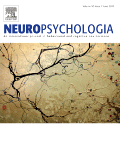
Neuropsychologia
Scope & Guideline
Advancing Insights into Behavioral and Cognitive Processes
Introduction
Aims and Scopes
- Neural Mechanisms of Cognition:
The journal emphasizes studies that investigate the neural correlates of cognitive processes such as memory, attention, language, and perception, often utilizing techniques like fMRI, EEG, and TMS. - Clinical Neuropsychology:
Research addressing cognitive impairments resulting from neurological disorders, including Alzheimer's disease, Parkinson's disease, and traumatic brain injury, is a core focus, contributing to the understanding of neuropsychological rehabilitation. - Cognitive Neuroscience Methodologies:
Neuropsychologia showcases innovative methodologies in cognitive neuroscience, combining behavioral experiments with neuroimaging and electrophysiological measures to elucidate the brain-behavior relationship. - Developmental and Lifespan Perspectives:
The journal includes studies on cognitive development across the lifespan, examining how aging, developmental disorders, and early life experiences shape cognitive functions and neural processing. - Interdisciplinary Approaches:
Neuropsychologia promotes interdisciplinary research, drawing connections between neuroscience, psychology, linguistics, and education, facilitating a holistic understanding of cognitive processes.
Trending and Emerging
- Neuroplasticity and Rehabilitation:
There is a growing body of research focused on neuroplasticity and its implications for cognitive rehabilitation, particularly in clinical populations, highlighting the brain's capacity to adapt following injury or dysfunction. - Emotion and Cognition Interactions:
Studies examining how emotional states influence cognitive processes, such as memory retrieval and decision-making, are gaining traction, underscoring the importance of affective neuroscience. - Social Neuroscience:
Research exploring the neural basis of social cognition, including empathy, theory of mind, and social decision-making, is increasingly prevalent, reflecting a broader interest in understanding interpersonal dynamics. - Multimodal and Ecological Approaches:
The trend towards integrating various methodologies, such as combining neuroimaging with behavioral tasks in naturalistic settings, is on the rise, emphasizing the need for more ecologically valid research. - Bilingualism and Cognitive Control:
Emerging studies are investigating the cognitive benefits of bilingualism, particularly in relation to executive functions and neural efficiency, contributing to the understanding of language processing in diverse contexts.
Declining or Waning
- Traditional Neuropsychological Assessments:
Research centered on conventional neuropsychological tests appears to be waning, as the field increasingly embraces more dynamic and ecologically valid approaches to assessing cognitive functions. - Static Brain Mapping Studies:
There is a noticeable reduction in studies relying solely on static lesion mapping methods, as more emphasis is placed on functional connectivity and dynamic network analyses within cognitive neuroscience. - Single-Domain Language Studies:
Research focusing exclusively on language processing in isolation is becoming less common, with a shift towards exploring language in the context of broader cognitive functions and multimodal processing. - Reductionist Models of Cognition:
The simplistic, reductionist models that fail to account for the complexity of cognitive processes are being replaced by integrative models that consider the interactions between various cognitive domains and neural systems.
Similar Journals

NEUROPSYCHOLOGY REVIEW
Fostering Interdisciplinary Dialogues in NeuropsychologyNEUROPSYCHOLOGY REVIEW is a prestigious journal published by Springer, dedicated to the exploration of cognitive processes and behavior through neurological and psychological perspectives. With its ISSN 1040-7308 and E-ISSN 1573-6660, this journal holds a distinguished position in Q1 of the Neuropsychology and Physiological Psychology category, ranking at #3 out of 76 with an impressive 96th percentile in Scopus. Since its inception in 1990, it has provided a critical platform for researchers, professionals, and students to disseminate and engage with comprehensive reviews and empirical research, promoting a deeper understanding of the interplay between neural mechanisms and psychological phenomena. Aimed at fostering interdisciplinary collaboration and advancement in the field, NEUROPSYCHOLOGY REVIEW invites contributions that push the boundaries of knowledge and stimulate ongoing debates in neuropsychology, making it an invaluable resource for anyone interested in the latest scientific advancements within this dynamic area.
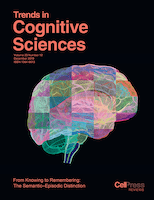
TRENDS IN COGNITIVE SCIENCES
Transforming Perspectives in Experimental PsychologyTRENDS IN COGNITIVE SCIENCES, published by CELL PRESS, stands as a premier platform for the dissemination of high-quality research in cognitive neuroscience, experimental psychology, and neuropsychology. With an impressive impact factor and consistently placed in the Q1 category across multiple dimensions of cognitive research, this journal not only ranks in the top tier of its fields—holding the 1st position in both Cognitive Neuroscience and Neuropsychology but also boasts an exceptional percentile ranking of 99. As it converges from 1997 to 2024, it reflects the evolving landscape of cognitive sciences, making it a vital resource for researchers, professionals, and students seeking to stay updated on influential trends and groundbreaking studies. Though not an open-access journal, TRENDS IN COGNITIVE SCIENCES offers readers access to a wealth of information that shapes our understanding of complex cognitive processes and behaviors.

Journal of Cognitive Enhancement
Transforming Knowledge into Practice for Cognitive Growth.Journal of Cognitive Enhancement, published by SpringerNature, is a premier academic platform dedicated to advancing knowledge in the fields of Cognitive Neuroscience, Behavioral Neuroscience, and Experimental Psychology. With an electric combination of rigorous research and innovative practice, this journal has established itself as an essential resource for researchers, professionals, and students interested in understanding the mechanisms behind cognitive enhancement and its implications for mental health and cognitive function. As of 2023, it is recognized in the Q2 and Q3 quartiles across several categories, demonstrating its solid impact in the academic community, particularly with an impressive Scopus ranking of #27/76 in Neuropsychology and Physiological Psychology. Operating in a competitive landscape, the Journal of Cognitive Enhancement fosters open dialogue and collaboration through valuable contributions to cognitive research, facilitating insights that are crucial for practical applications in clinical and educational settings. While specific open access options are currently not defined, we encourage all interested scholars to explore the rich database of published works dating from 2017 to 2024, contributing to this dynamic field of study.

BRAIN AND LANGUAGE
Connecting the Dots Between Thought, Speech, and NeuroscienceBRAIN AND LANGUAGE is a premier journal published by Academic Press Inc Elsevier Science, dedicated to fostering scholarly communication in the fields of Cognitive Neuroscience, Linguistics, Psychology, and Speech and Hearing. With its ISSN 0093-934X (Print) and 1090-2155 (Online), the journal has established a significant presence since its inception in 1974, continuing to provide valuable insights into the intricate relationship between brain function and language processing. This journal is highly regarded, boasting a 2023 ranking of Q1 in Linguistics and Language, reflecting its influential contributions to the field, alongside Q2 rankings in categories such as Cognitive Neuroscience and Experimental Psychology. With a rigorous peer-review process, it serves as an essential resource for researchers and professionals seeking to deepen their understanding of language mechanisms and their cognitive underpinnings. Despite not being an Open Access journal, BRAIN AND LANGUAGE ensures that its articles are widely accessible and of high quality, making it an indispensable platform for both emerging and established scholars aiming to expand the boundaries of research in language and cognition.
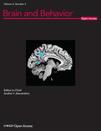
Brain and Behavior
Advancing Knowledge in Behavioral Neuroscience.Brain and Behavior is a premier open-access journal published by WILEY, dedicated to advancing the field of Behavioral Neuroscience. With its ISSN 2162-3279, the journal has established itself as a vital resource for researchers, professionals, and students alike, fostering the dissemination of cutting-edge research since its inception in 2011. Renowned for its rigorous peer-review process, it enjoys a commendable Q2 ranking within the field, reflecting its impactful contributions and relevance in the scientific community. The journal not only emphasizes innovative studies that bridge behavioral science and neuroscience but also serves as a platform for diverse methodologies and interdisciplinary approaches. Accessible [open access](https://onlinelibrary.wiley.com/journal/21623279), Brain and Behavior invites submissions that explore the neural mechanisms underlying behavior, aiming to engage a global audience eager to expand the boundaries of knowledge in this dynamic field. Positioned in the heart of the United States, at 111 River St, Hoboken, NJ, it is strategically placed to collaborate with leading institutions and researchers worldwide.
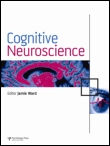
Cognitive Neuroscience
Fostering Interdisciplinary Dialogues in NeuroscienceCognitive Neuroscience is a pivotal journal in the ever-evolving field of cognitive neuroscience, published by Routledge Journals, Taylor & Francis Ltd, in the United Kingdom. Since its inception in 2010, this journal has dedicated itself to publishing innovative research that explores the intricate relationships between neural mechanisms and cognitive processes. With an increasing focus on interdisciplinary studies, it addresses critical issues from both theoretical and empirical perspectives. Although it currently holds a Q3 ranking in the Cognitive Neuroscience category, it has made significant strides in its Scopus ranking, now positioned at #62 out of 115, reflecting its growing impact on the academic community. Researchers and professionals will find the journal an invaluable resource for staying updated on the latest findings and methodologies in the field. While the journal operates under a traditional access model, it ensures high visibility and dissemination of crucial research that shapes our understanding of the brain's role in cognition. As it continues to evolve through to 2024, Cognitive Neuroscience remains committed to fostering collaboration and inspiring future innovations within the discipline.
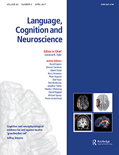
Language Cognition and Neuroscience
Exploring the Neural Pathways of Language and ThoughtLanguage Cognition and Neuroscience is a premier peer-reviewed journal published by ROUTLEDGE JOURNALS, TAYLOR & FRANCIS LTD, focusing on the intersection of linguistics, cognitive psychology, and neuroscience. Since its inception in 2013, this journal has established itself as a vital resource for researchers and scholars, contributing significantly to the understanding of how language is processed and represented in the brain. With its impressive rankings in various categories—Q1 in Linguistics and Language, Q2 in Cognitive Neuroscience, and Experimental and Cognitive Psychology—it caters to a diverse and interdisciplinary audience. The journal is accessible to readers worldwide, effectively communicating cutting-edge research and innovative methodologies in the field. Open Access options enable broader disseminations of knowledge, ensuring that significant findings reach both academic and practical applications. With a commitment to high-quality research, Language Cognition and Neuroscience continues to be an influential platform for advancing theories and practices within cognitive science and language studies.
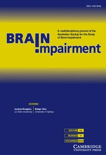
Brain Impairment
Unraveling the complexities of brain function.Brain Impairment, published by Cambridge University Press, is a pivotal academic journal dedicated to advancing the understanding of neurological conditions and cognitive processes. With its ISSN 1443-9646 and E-ISSN 1839-5252, this esteemed journal has been at the forefront of research in the fields of Behavioral Neuroscience, Cognitive Neuroscience, and Neuropsychology since its inception in 2004. Covering a broad scope, it addresses critical insights into brain function, impairments, and therapies, making it a valuable resource for researchers, clinicians, and students alike. Brain Impairment holds various rankings, including Q4 in Behavioral Neuroscience and Q2 in Speech and Hearing, reflecting its significance in the academic community. While the journal operates under print access, its rich content serves as an essential reference for professional development and scholarly discussion in the UK and beyond. Researchers and practitioners can rely on this journal to provide cutting-edge research and reviews that inform clinical practice and shape future studies in neurology and cognitive neuroscience.
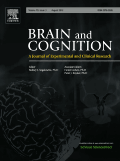
BRAIN AND COGNITION
Bridging Brain Function and Cognitive UnderstandingBRAIN AND COGNITION, published by Academic Press Inc Elsevier Science, stands as a vital resource for researchers and practitioners in the realms of cognitive neuroscience and psychology. Established in 1982, the journal has continuously evolved, showcasing cutting-edge research that bridges the understanding of brain functions and cognitive processes up to 2024. With an impressive impact factor reflecting its commitment to high-quality scholarship, the journal currently holds a prestigious Q1 ranking in Arts and Humanities (miscellaneous) and notable Q2 rankings in various psychology fields, including Cognitive Neuroscience, Developmental and Educational Psychology, Experimental and Cognitive Psychology, and Neuropsychology. This multidisciplinary journal cultivates a rich academic dialogue, offering valuable insights to professionals, researchers, and students alike. Although it does not offer open access, its robust indexing in Scopus and consistent contribution to important discussions in cognitive research define its critical role in advancing knowledge and innovation in the cognitive sciences.

Journal of Cognitive Science
Pioneering Research in Cognitive ProcessesThe Journal of Cognitive Science, with ISSN 1598-2327, is a distinguished publication from SEOUL NATL UNIV, INST COGNITIVE SCIENCE, focusing on the multidisciplinary field of cognitive science. Established in 2016, this journal aims to advance knowledge in various domains, including Artificial Intelligence, Cognitive Neuroscience, and Experimental Psychology, while also delving into Linguistics and Language. Although currently categorized in Q4 for several subjects in the 2023 rankings, it presents an invaluable platform for innovative research and scholarly discourse, providing insights that connect cognitive processes with practical applications, thus fostering cross-disciplinary collaboration. Located in South Korea, the journal adheres to rigorous academic standards, inviting submissions that contribute significantly to understanding cognition in a digital age. While it does not offer Open Access, readers can access articles through university libraries and academic databases, engaging with the latest findings and theories that shape the future of cognitive science.